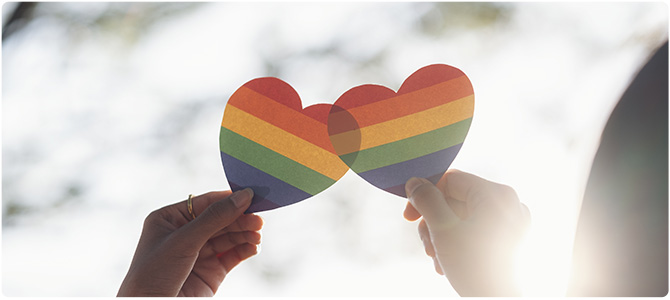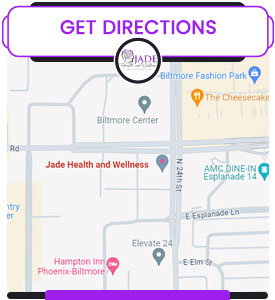LGBTQ Therapy Specialist in Phoenix, AZ
If you’re looking for emotional support, and are also a member of the LGBTQ community, then consulting with a specializing LGBTQ therapist can often be beneficial. This type of therapist may be a member of the community themselves or have extensive experience counseling those within it. At Jade Health and Wellness Center, Dr. Courtney Gaines offers judgment-free therapy that is specialized to you and your unique needs. For more information, contact us today or book an appointment online. We are conveniently located at 2375 East Camelback RD Suite 600 Phoenix, AZ 85016.


Table of Contents:
What does LGBTQ stand for?
What issues do LGBTQ people face?
Why is it helpful to work with an LGBTQ counselor?
When should someone see an LGBTQ counselor?
Therapy is a safe space where you can express your thoughts and feelings to a medical practitioner without judgment. By having a certified therapist in your corner, supporting you through issues and experiences that are impacting your life, you can address these areas safely and productively.
LGBTQ is an acronym that stands for lesbian, gay, bisexual, transgender, or queer/questioning.
We have broken down these terminologies below:
● Lesbian. Women who are attracted to other women.
● Gay. This typically refers to men who are attracted to other men, though it also sometimes is used as a broader umbrella term for same-sex partnerships.
● Bisexual. Attraction to more than one gender.
● Transgender. This refers to people whose gender identity is different from the biological sex that they were assigned at birth.
● Queer/Questioning. Queer is a broad and nuanced term that typically indicates that someone is not straight or that their sexuality or gender identity is fluid. Questioning typically refers to someone who is exploring their sexuality and/or gender.
Those in the LGBTQ community encounter many of the same struggles as heterosexuals, however, they also have the additional stress of navigating issues specifically related to their sexuality, gender identity, and attractions.
This includes:
● Finding a supportive community.
● Dealing with bigotry and discrimination on a personal and/or professional level.
● Dealing with homophobia and/or transphobia.
● Coming out to their friends and family.
● Understanding their sexuality and identity.
● Worrying about how others will react to them coming out.
● Tension in personal relationships, most often with family.
● Navigating how to find and engage in romantic or sexual relationships.
● Dealing with internalized oppression.
● Feelings of loneliness and/or isolation.
● Feeling like they don’t belong or that something is wrong with them.
● Utilizing unhealthy coping strategies.
LGBTQ therapy is specifically designed to support the unique needs and problems faced by those in the LGBTQ community. Marginalized groups face concerns that may not be apparent to those outside of those groups, such as the process of coming out or experiencing gender dysphoria, so it’s important to consult with an LGBTQ counselor who is well-versed in those issues and can understand where you’re coming from.
A specializing counselor ensures a safe place for a member of the LGBTQ community to talk, address their issues, and express how they’re feeling without judgment, discrimination, or misunderstanding. With LGBTQ therapy, trust, acceptance, and informed care is non-negotiable and leads to overall more effective care.
If you’re part of the LGBTQcommunity and are in need of mental and emotional support, then an LGBTQ counselor can help to provide the informed care that you’re looking for. They can help you navigate distressing thoughts and feelings, societal obstacles, discrimination, marginalization, and stigmas while also aiding in the development of healthy communication and coping strategies.
Although a person’s sexual or romantic orientation or gender identity may not be a source of distress, it’s always important to seek guidance from a medical practitioner who will address your unique concerns inclusively and thoughtfully. It can be difficult to find healthcare providers that understand the nuances of the LGBTQ community which is why so many patients find it helpful to seek help from a mental health therapist who specializes.
If you’re part of the LGBTQ community and are in need of mental and emotional support, then an LGBTQ counselor can help to provide the informed care that you’re looking for. They can help you navigate distressing thoughts and feelings, societal obstacles, discrimination, marginalization, and stigmas while also aiding in the development of healthy communication and coping strategies.
Although a person’s sexual or romantic orientation or gender identity may not be a source of distress, it’s always important to seek guidance from a medical practitioner who will address your unique concerns inclusively and thoughtfully. It can be difficult to find healthcare providers that understand the nuances of the LGBTQ community which is why so many patients find it helpful to seek help from a mental health therapist who specializes.
At Jade Health and Wellness Center, we recognize and understand the unique challenges that are faced by the LGBTQ community. Our team of knowledgeable and experienced LGBTQ counselors offers the insightful and informed care that you need to help bolster your mental health. For more information, contact us today or book an appointment online. We are conveniently located at 2375 East Camelback RD Suite 600 Phoenix, AZ 85016. We serve patients from Phoenix AZ, Scottsdale AZ, Paradise Valley AZ, Alhambra AZ, Tempe AZ, and surrounding areas.


Additional Services You May Need
▸ ADHD/ADD
▸ Anxiety Disorders
▸ Bipolar Disorders
▸ Borderline Personality Disorder
▸ Depression Disorders
▸ Eating Disorder
▸ Grief Therapy
▸ Life Coaching
▸ Men’s Mental Health
▸ Mental Health Therapy
▸ Mood Disorders
▸ OCD Disorders
▸ PTSD Disorders
▸ Panic Disorders
▸ Stress Disorders
▸ Talk Therapy
▸ Women’s Mental Health
▸ Social Phobia


